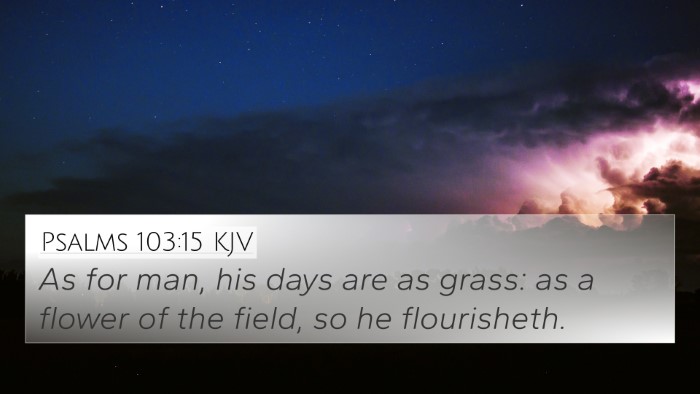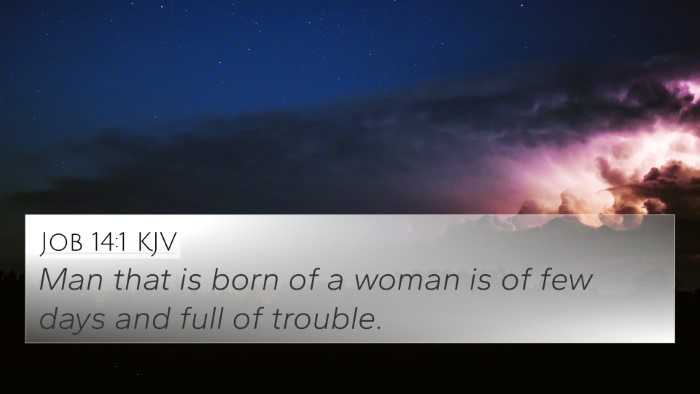Old Testament
Genesis Exodus Leviticus Numbers Deuteronomy Joshua Judges Ruth 1 Samuel 2 Samuel 1 Kings 2 Kings 1 Chronicles 2 Chronicles Ezra Nehemiah Esther Job Psalms Proverbs Ecclesiastes Song of Solomon Isaiah Jeremiah Lamentations Ezekiel Daniel Hosea Joel Amos Obadiah Jonah Micah Nahum Habakkuk Zephaniah Haggai Zechariah MalachiJob 10:20 Similar Verses
Job 10:20 Cross References
Are not my days few? cease then, and let me alone, that I may take comfort a little,
Uncover the Rich Themes and Topics of This Bible Verse
Listed below are the Bible themes associated with Job 10:20. We invite you to explore each theme to gain deeper insights into the Scriptures.
Job 10:20 Cross Reference Verses
This section features a detailed cross-reference designed to enrich your understanding of the Scriptures. Below, you will find carefully selected verses that echo the themes and teachings related to Job 10:20 KJV. Click on any image to explore detailed analyses of related Bible verses and uncover deeper theological insights.

Job 8:9 (KJV) »
(For we are but of yesterday, and know nothing, because our days upon earth are a shadow:)

Psalms 103:15 (KJV) »
As for man, his days are as grass: as a flower of the field, so he flourisheth.

Psalms 39:5 (KJV) »
Behold, thou hast made my days as an handbreadth; and mine age is as nothing before thee: verily every man at his best state is altogether vanity. Selah.
Job 10:20 Verse Analysis and Similar Verses
Understanding Job 10:20
Job 10:20 (KJV): "Are not my days few? cease then, and let me alone, that I may take comfort a little."
Summary of Insights
This verse captures Job's deep sense of agony and desperation in the face of his suffering. He questions the purpose of his pain, yearning for a brief respite from his anguish. The richness of this verse extends into profound themes of human suffering, divine justice, and the relationship between the creator and the created. The combined insights from notable public domain commentaries provide a holistic understanding of this poignant statement.
Commentary Insights
Matthew Henry’s Commentary
Matthew Henry views Job's plea as an expression of his overwhelming distress. Job recognizes the brevity of his life and pleads for a moment of peace. Here, Henry elaborates on the notion that human life is fleeting, suggesting that Job yearns for divine consideration—a break from the relentless scrutiny and suffering he faces. He underscores the spiritual struggle that accompanies profound sorrow, revealing a man grappling with his faith amid turmoil.
Albert Barnes’ Notes on the Bible
Barnes emphasizes the melancholic mood of Job's reflection. Job's "days" are described as few, highlighting the ephemeral nature of life, and he requests solitude to find comfort. Barnes notes that this longing for privacy serves as a desire for solace rather than an expression of despair against God's will. It reveals a human need to seek comfort in times of desolation, pointing towards the universal quest for peace amidst suffering.
Adam Clarke’s Commentary
Clarke interprets this verse through the lens of Job's existential contemplation. He digs into the cruelty of external judgment and the internal struggle of the soul. Clarke presents Job's wish for solitude as a cry for relief, underscoring that the burden of suffering often leads to such pleas. He perceives Job's statement as a moment of vulnerability and recognition of his mortality, which invites the reader to ponder their own relationship with suffering and the divine.
Thematic Connections
Job 10:20 opens up several thematic connections within the scripture:
- Human suffering and divine purpose
- The fleeting nature of life (Psalm 39:5)
- Seeking solace in solitude (Lamentations 3:28)
- The desire for divine comfort (2 Corinthians 1:3-4)
- The struggle of faith amidst trials (James 1:2-4)
- The complexity of divine justice (Romans 9:20-21)
- The insights of lamentation (Psalm 6:6-7)
Bible Cross References for Job 10:20
To further explore the meanings in Job 10:20, here are some cross-referenced verses that highlight similar themes:
- Psalm 39:4-5: “Lord, make me to know mine end, and the measure of my days, what it is...”
- Lamentations 3:28: “Let him sit alone and keep silence...” highlighting the necessity of solitude in suffering.
- Psalm 31:10: “For my life is spent with grief, and my years with sighing...” reflecting on the weight of sorrow.
- Hebrews 4:15: “We have not an high priest which cannot be touched with the feeling of our infirmities...” indicating empathy in suffering.
- 2 Corinthians 1:3-4: “Blessed be God, even the Father of our Lord Jesus Christ...” which discusses comfort in tribulation.
- 1 Peter 5:7: “Casting all your care upon him; for he careth for you.” emphasizing reliance on divine care.
- James 1:2-4: “My brethren, count it all joy when ye fall into divers temptations...” focusing on trials and maturity in faith.
- Romans 8:18: “For I reckon that the sufferings of this present time are not worthy to be compared with...” which offers hope amidst suffering.
Conclusion
Job 10:20 serves as a poignant reminder of the human experience in relation to suffering and the quest for divine understanding and comfort. Through the lenses of various Bible commentaries, one finds a rich tapestry of insights that speak to the profound struggle within Job as he navigates his pain. The connections to other biblical themes and verses further emphasize the universality of such sentiments across scripture.
Further Study
For those interested in exploring more about the connections between this verse and others, utilizing tools for Bible cross-referencing, such as a Bible concordance or a cross-reference Bible study guide will enhance the understanding of the text. A comprehensive Bible cross-reference material can serve as a resource to find deeper thematic connections and parallels, illuminating the dialogues that exist within the sacred text.








